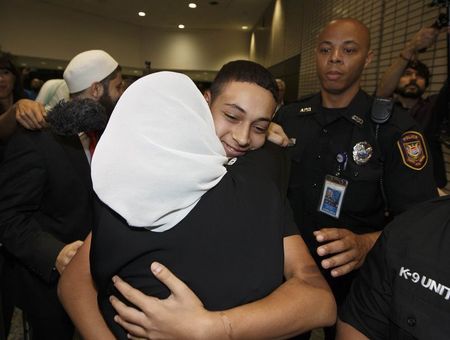By Letitia Stein
TAMPA Fla (Reuters) - A Florida teenager who was detained in Israel and apparently beaten by police returned home on Wednesday, eager to seek medical care and put behind him a summer trip that drew renewed world attention to the Israeli-Palestinian conflict.
Tariq Khdeir, 15, was greeted by cheering relatives, friends and media at Tampa International Airport. He said he felt good, while bruises on his face that had spurred a probe into complaints that he was beaten while in Israeli police custody, were significantly faded.
Calling his attack by masked police "the scariest thing that has happened to me," Khdeir told reporters he believes his story drew outrage largely because he was a U.S. citizen.
"You only know my story because I am an American," he said. "I am only 15, but I will never think about freedom in the same way," he added.
A high school student at a private Islamic school in Tampa, Khdeir was vacationing in Jerusalem with his parents and younger sisters on a summer trip to visit their Palestinian relatives.
He was arrested during protests after his cousin, Mohammed Abu Khudair, 16, was abducted and killed in early July, sparking calls from Palestinians for a new uprising against Israel.
The Maryland-born teenager's homecoming follows his release from house arrest in Israel, where an investigation into his treatment by police is continuing.
Khdeir has said he was not involved in clashes with police prior to his detention along with five other protesters.
Friends and relatives in Florida awaiting his return were anxious for him to be evaluated by U.S. doctors. Khdeir's father complained that Israeli officers denied his son proper medical treatment after they beat him.
Khdeir looks forward to returning to school and going fishing with his friends, he told reporters.
He and his mother asked supporters to remember all the children killed in recent weeks during the resurgent Israeli-Palestinian violence.

"They have names like mine," Khdeir said. "No child, whether they are Palestinian or Israeli, deserves to die that way."
(Editing by David Adams and Clarence Fernandez)
